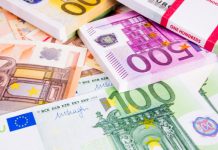- Pound (GBP) is falling after 6-days of gains
- PM Sunak announced an election on July 4th
- Euro (EUR) rises after PMI data
- Negotiated wages rise to 4.7% in Q1
The Pound Euro (GBP/EUR) exchange rate is falling after six days of gains. The pair rose +0.34% in the previous session, settling on Wednesday at €1.1746 and trading in a range between €1.1703 and €1.1762. At 10:00 UTC, GBP/EUR trades -0.09% at €1.1735.
The pound is falling as investors consider the latest business activity data and news that the UK will hold a general election in July.
Prime Minister Rishi Sunak announced yesterday that the UK would head to the polls on July the 4th to vote for a new Prime Minister. The announcement comes as Labour holds a lead in the polls. However, political uncertainty over the coming six weeks means that demand for the pound could wane.
On the data front, business activity grew at a slightly slower pace in May, with the composite PMI easing to 52.8, down from 54.1 in April. Breaking this figure down further, the service sector activity slowed to 52.9, down from 55 in April, while manufacturing activity returned to growth, rising above the 50 level that separates expansion from contraction.
The slowing of service sector growth comes after service sector inflation yesterday was hotter than expected at 5.9%, down from 6% in March but still well above the 5.5% forecast.
The euro is heading higher as investors cheer stronger-than-expected business activity, particularly in Germany, the eurozone’s largest economy.
Germany saw its service sector activity grow at a faster pace and its manufacturing sector contract at a slower pace, lifting the composite PMI to 52.2 from 50.6.
Meanwhile, the composite PMI in the eurozone was also stronger than expected at 52.3, up from 51.7, thanks to signs of improvement in the manufacturing sector. The data supports the view that the eurozone economy is recovering.
Separately, Eurozone-negotiated wages in Q1 rose 4.7%, defying expectations of a fall to 4%. The data provides a mild dilemma for the ECB over whether to cut rates in June.





